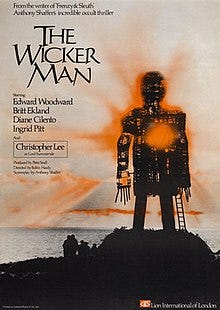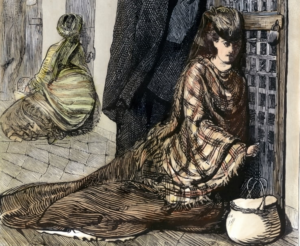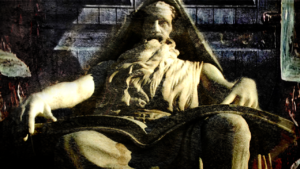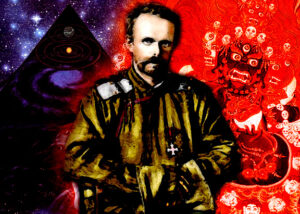The Wicker Man (1973)

Film Analysis
The film, popularly deemed as “pagan”, is, in fact, pagan, but that paganism is extracted from the core essence of Christianity. In it, it shows the conflict between a man of devout Catholic faith and the country folk of Summerisle. But this Summerisle…when we begin to forge an image in our minds of what the “Wilderness” is, we toss around the idea of something quite different from what our current civilization stands for. The Wilderness is cast as a place barbaric and alien, and we’re left with a fatal choice to die within the walls of societal salvation or to starve our humanity within a lost void beyond it. The film depicts a stark contrast between the two sentiments and marries them under the name of “resurrection”. Lord Summerisle, clearly uncomfortable with the possibility of he himself being the ultimate sacrifice should the sergeant not suffice the sun goddess—does this not evoke the fear felt within anyone who sacrifices their ego and replaces it with staunch, unyielding religious devotion?
No, this film does not depict the “true” nature of a people independent of civilized, religious doctrine. On the contrary, it shows the rudeness of Christian worship. As I watched this, I couldn’t help but to feel empathy for the sergeant who was simply trying to do what was right and fair, not manipulative and conniving. But this is exactly the point of the film: through its paganism, it circles back around to the death and rebirth of Christ. Just as much as atheism, paganism too lies on the same Christian spectrum as do satanism also. Call it the “dark side” of Abrahamic faith, if you will.
It was said too in the film that a person does not die, but returns to the Earth and its animals and elements, and the hero must be sacrificed to bring back the fertility of the crops. And he couldn’t have been just anyone. It was explained he had to be a virgin man of law and order, coming there of his own free will as the fool himself. In the beginning of the movie, it displayed himself at the Eucharist—consuming the flesh and blood of Christ as bread and wine. The isle didn’t just need him for the crops. If it was only fruit they wanted, there would’ve been plenty of other ways they could attain that, such as permaculture. They could’ve also traded with other communities to ensure their people would be well-fed still. But this did not happen. What they wanted were his qualities, his spirit to be a part of them. In quite the paradoxical way, they wanted to be him. They did, in fact, look up to that law and order and morality. Which could only mean one thing: that they needed this contrast to their own way of living to ensure their way of living would exist and carry on. Without this stark binary, how could they continue their path? How could they measure and relate themselves to the other end of the same spectrum? It was identity they were after. They needed something, or someone, an outsider to validate their Being. And this was the ultimate means. The nature of the fool is, after all, to juggle paradoxes.
This conflict does not only reside within the very topical liberal versus conservative debate. This conflict sows the very grain of the modern world, whether we’re speaking of today or of any point in modernity for the past two millennia. It’s still the tribal mind of “we versus them”. Yes, this is nature. This is survival. Is this what life is? Perhaps it’s one form, a civilized form. But it’s not the only. I, for one, would like to see a world unconcerned with religion and politics. A quiet world that is comfortable with its own identity that it needn’t to prove itself. A world where power is not mediated by the validation of crowds. A place that seeks to explore and eat healthily, whose mission is not to squabble and dominate each other, but to fly. That is a place the Wilderness is, free of toxins and neural tensions.

Republished from Moonstone Substack











